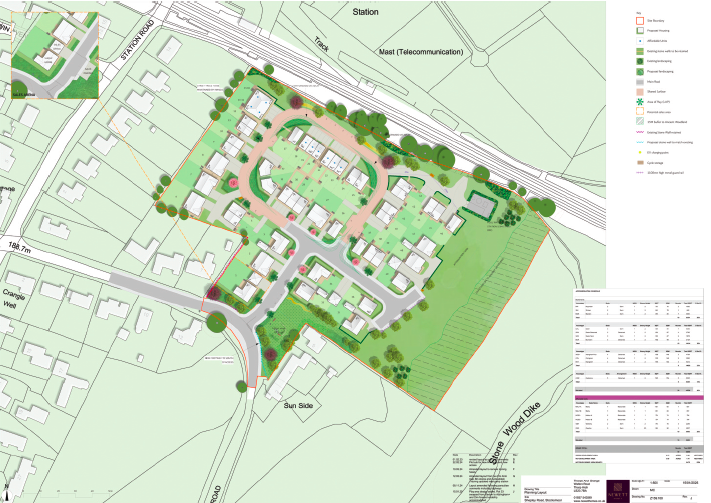
Navigating planning reforms: Insights from Krishna Mistry, Head of Planning at Newett Homes
December 2024 was a busy month in the planning industry, badged as Planning Reform month. Following the publication of the revised NPPF in December 2024, we quickly saw several ministerial announcements and reform papers emerging. It was encouraging to see the
Government bolster its commitment in placing housing at the top of their agenda to address the housing crisis and kick start growth in the economy.
As a regional SME housebuilder operating in Yorkshire, we’ve established a presence in the local housing market, focusing on residential development and actively contributing to the area’s housing supply. We engage with local planning authorities and communities as a core part of our development process and welcome these changes, which promise more transparent and efficient planning.
The Government’s introduction of a standard methodology for calculating housing need across the country is a significant step forward. This approach removes lengthy debates, protracted timescales and costly consultant fees in a bid to challenge housing numbers. As an SME, we haven’t had the spending power to challenge housing numbers given the burdensome costs and timescales compared to volume housebuilders with perhaps a deeper pocket.
 The Planning and Infrastructure Bill was published on 10 March, setting out the return of strategic planning. Many will remember this structure in the form of Regional Assemblies and Regional Spatial Strategies (15-20 years ago). Bringing back strategic planning focuses on cross boundary collaboration, joining the dots on matters such as infrastructure planning, the distribution of housing and nature recovery. It’s an exciting time to see Planning and Infrastructure growth taking centre stage and breaking down barriers between local authorities – after all development shouldn’t just stop at local authority boundaries, particularly given the level of housing growth envisaged across our region, and on edge of settlements.
The Planning and Infrastructure Bill was published on 10 March, setting out the return of strategic planning. Many will remember this structure in the form of Regional Assemblies and Regional Spatial Strategies (15-20 years ago). Bringing back strategic planning focuses on cross boundary collaboration, joining the dots on matters such as infrastructure planning, the distribution of housing and nature recovery. It’s an exciting time to see Planning and Infrastructure growth taking centre stage and breaking down barriers between local authorities – after all development shouldn’t just stop at local authority boundaries, particularly given the level of housing growth envisaged across our region, and on edge of settlements.
Regionally, we saw local mayors sign the White Rose Agreement, with the Mayor of York and North Yorkshire, David Skaith, Mayor of West Yorkshire Tracy Brabin and Mayor of South Yorkshire, Oliver Coppard – it feels like we’re finally on the cusp of collaborative delivery through devolution, and really delivering on the Northern Powerhouse engine, and creating connections regionally! As an SME housebuilder, we can see opportunities to benefit from increased demand for housing and development projects driven by this economic growth.
The Bill seeks to streamline planning decisions through a national scheme of delegation, setting out that only the most important schemes go to committee, and the requirement for Members to undertake mandatory certified training.
Most recently we have seen a reserved matters applications overturned by Members, despite collaboratively working with Officers to agree a policy compliant, suitable scheme. We are now left with progressing an appeal, incurring delays, further costs and impacts on our delivery programme. We look forward to further details on how modernising committees will support our ambitious growth plans, within an arena where we have seen the collapse of SME’s in the industry. The Planning and Infrastructure Bill has also set out the ability to empower Local Planning Authorities to vary or set planning application fees, and ringfencing them to planning departments to help resource LPAs. This is a first (ringfencing), and whilst it comes at higher cost to us – these are promising changes which will directly enhance the efficiency and quality of the local planning process we will experience.
 We have seen confidence in the recruitment market with local planning authorities attracting new talent and planning departments slowly beginning to fill seats. We’re also seeing the Government actively use its intervention powers, where Members in South Tyneside on two occasions, voted against the submission of the local plan for examination. It sends a powerful message to the industry that the
We have seen confidence in the recruitment market with local planning authorities attracting new talent and planning departments slowly beginning to fill seats. We’re also seeing the Government actively use its intervention powers, where Members in South Tyneside on two occasions, voted against the submission of the local plan for examination. It sends a powerful message to the industry that the
Government means business in delivering growth. We’re pleased to see the Governments acknowledgement within national policy that SME’s can make an important contribution to meeting the housing requirement and are often built out relatively quickly.
Despite these positive changes, we continue to face several challenges, around the growing cost of delivering new homes, the forthcoming Building Safety Levy, recent changes to flood risk mapping and delays in the planning process – which continue to push us back. The HBF report – State of Play:
Challenges and Opportunities facing SME home builders, highlights that over half of SME house builders reported waiting over a year to obtain planning permission. This is certainly our experience.
However, the speed of planning reform is encouraging, the second reading of the Infrastructure Bill took place on 25 March 2025 – and the real test lies with making these changes in good time to be effectively before the end of the Government’s current term. As we navigate these reforms, we remain optimistic about a faster, more efficient planning system. However, we must ensure that the construction industry and market can keep pace with these changes. More needs to be done to ensure we have a skilled workforce ready to build new homes.
WANT TO KNOW MORE?
Visit Newett Homes to learn more about their developments at www.rdr.link/dbc022






